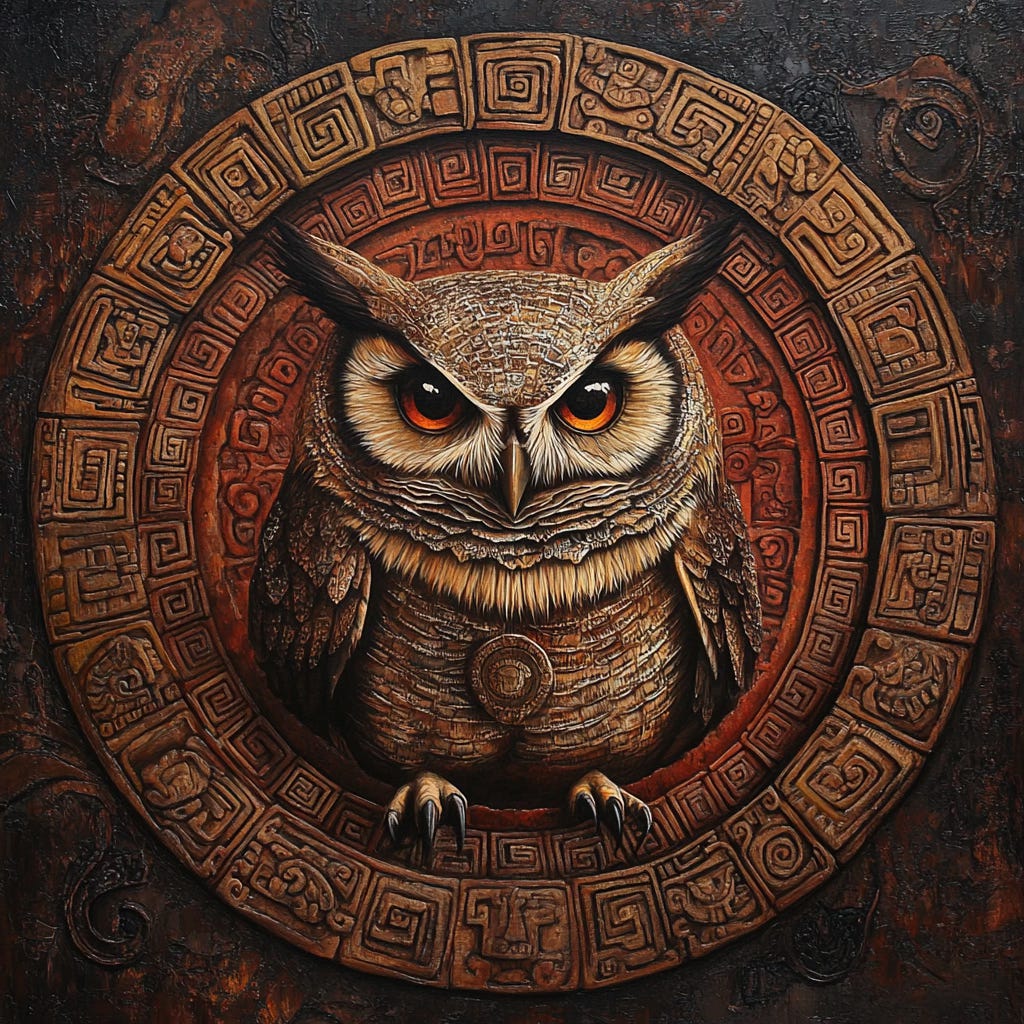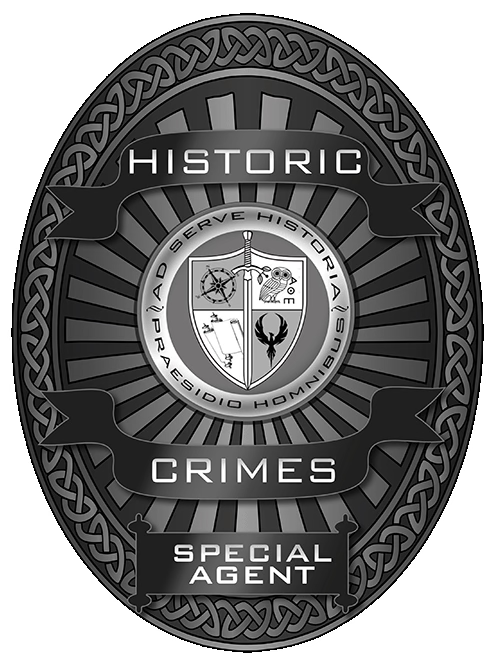I have a thing for owls.
It’s not an obsession or anything. I don’t have a collection of owl knick-knacks on my shelf, and I don’t do a lot of reading or studying about them. Some, but not a lot.
For example, I wrote a bit about owls in my book, The Girl in the Mayan Tomb. Among the Mayans, the owl was considered a symbol of death and the afterlife, and thus became the avatar or possibly even the embodiment of Ah-Puch, the Mayan god of death. In the story, the owl symbolism plays a pivotal role in the plot—I had some fun with it.
Later, once I established the special task force known as Historic Crimes, in which Dan Kotler and his FBI partner Roland Denzel are founding members, the owl made another appearance. The crest of the fledgling agency includes an image of the owl, as the traditional western symbol of wisdom. You can see that crest and its symbols on the Historic Crimes badge:
Someday, I really want to have some of these made, to sell in a shop... as long as they don’t get me arrested.
Owls are famously associated with Athena, the Greek goddess of wisdom, war, and strategy. A small owl (Athene noctua) was believed to be her companion, and thus become a symbol of knowledge and foresight. Ancient Greeks thought owls could see what others couldn’t—both in the dark and (metaphorically) into the truth of the world.
You see this in depictions of Athena, which often show her with an owl perched on her shoulder or flying nearby. Even the ancient Athenian drachma featured the owl as a mark of the city’s wisdom and strength.
Oddly, in a spate of cultural coincidence that I think falls well within the shadow of comparative mythology, the Romans shared a belief with the distant Mayans. In Roman culture, owls were seen as harbingers of death. Hearing an owl hoot at night, near a home, was a bad omen. It signaled someone’s impending doom.
Historical accounts say that owls were heard before the deaths of notable figures like Julius Caesar and Agustus—if not proof, then at least eery and chilling coincidence. And something fun for a future story, I think.
Closer to home (for me, at least), is the mythology and mysticism surrounding owls among the indigenous tribes of North America. Many Native American tribes view owls as powerful spiritual messengers, often linked to the afterlife or as guardians of sacred knowledge—a sort of confluence of viewpoints shared with the disparate cultures from across the oceans, lending even more credence to theories of some long lost shared culture.
This stuff is why I write so much about comparative mythology—it just makes my brain tingle.
I could go on. The Celts considered owls to be symbols of mystery, intuition, and hidden truth. In Hinduism, the owl is linked to Lakshmi, the goddess of wealth and prosperity. And in Medieval Europe, the nocturnal habits and eerie calls of owls gave rise to stories of witches and supernatural beings. Though in the typical western tradition of cultural cognitive dissonance, this same culture still hailed owls as symbols of wisdom. On the one hand, seeing an owl on your house was a sign of bad luck, but then that same viewer might carry an owl feather to ward off evil spirits.
We Europeans are a deeply confused people.
All that is fascinating. And I haven’t even gone into the biological facts, the habits and capabilities, or even the owl in modern culture. Maybe there’s a book in this, somewhere. Someday. Maybe.
But what I’m really here for is a name.
I came home from a day out, from some coffee shop or another where I had done some writing for the day. And when I got everything unpacked from my bag, replacing the items I’d carried from my desk, and was about to empty my pockets into the little wooden tray I use to organize my everyday carry, I saw this guy.
And I couldn’t help but laugh. Because the day before, in a genuinely casual and passive way, I had mentioned to Kara that I liked the little glass owl she’d gotten as a decoration for one of the livingroom tables. “I have a thing for owls,” I said. And again... passive and casual. I didn’t go into any of the detail you just read. I just made a statement and moved on with my day.
So when I got back and found this little guy sitting on my desk, watching me, hopefully seeing me as wise rather than weighing my soul for pending doom, it made me smile. First, because Kara knows me well enough and cares about me enough to make this gesture. And second, because he’s kind of a perfect fit for the space he occupies. He fits in so well, in my aesthetic and in my mind-mythology, that I’m a bit surprised. I would never have bought him myself, would never have placed him in that spot. Wouldn’t even have considered it.
But now that he’s there, he’s perfect.
So, I want to give him a name.
Actually, I want you to give him a name. I want to hear some suggestions and recommendations. And I need them to come from you, rather than me.
Because one thing I’ve learned, and a lesson this has reinforced, is that I am good at certain things, including naming things. Especially naming things. But when I do something—name something, write something, create art for something—it has the flavor of “Kevin did this.” I can see my fingerprints all over it. I’m not surprised by it, even if I think it’s clever.
But sometimes I want that surprise. I want someone else to put some thought into something, and give it as a gift. The way Kara did, with this owl, surprising me with it, leaving it in the perfect spot, where I would never have placed it. I’m looking for that, in a name.
So... what do you recommend?
I reserve the right to choose the one that clicks for me, and ignore the rest. But I value every suggestion. Leave it in the comments below, and when I choose a name, I’ll announce it here.
SPEAKING OF OWLS AND BOOKS...
Those books I mentioned above are all available at kevintumlinson.com/books. Go find something to read. It’s a hoot.
A NOTE AT THE END
In my late teens/early twenties, my friend Dave ended up with a pet owl. He named him “Blinky.” It was a nod to an episode of Moonlighting, though right now I can’t quite remember the setup.
Dave took great care of that owl. Nursed him back to health, as I recall. And I remember seeing the little guy perched on Dave’s arm, calm and in no way afraid.
Eventually, when Blinky was healed up from whatever had ailed him, Dave took him outside and let him fly free. I remember watching him soar away into the trees surrounding Dave’s house—a good natural habitat for an owl. Plenty of cover, plenty of places to nest, plenty of small vermin and other creatures for food. It was a good life for an owl.
I was a little sad to see him go. Not as much as I would be today—for some reason I was low on empathy back then. I’ve become softer in my advancing years.
But the lesson, really, was a good one. Sometimes things come into our lives for a season. We may love them, and we may not want to see them go. But the responsible thing is to let life be what life will be. Value the moment you had, but be willing to let things be as they should be.
I wasn’t wise enough to understand that lesson then, but maybe that was Blinky’s gift. A bit of owl wisdom, laid like an egg in my memory, hatching decades later just when it could do the most good
.







Alfred (means wise counselor)
I submit the name Rajawal for your owl.